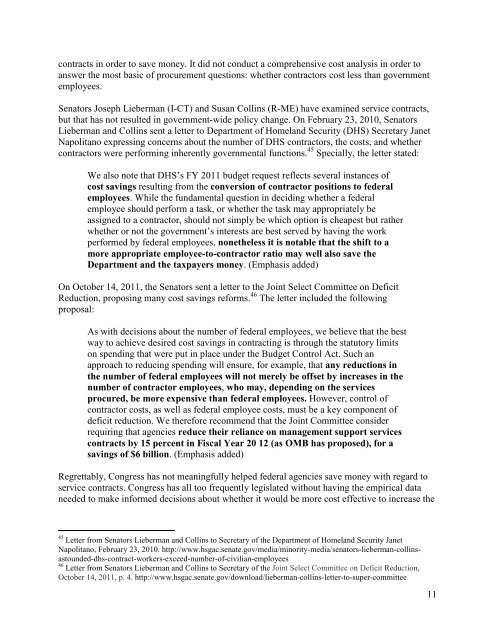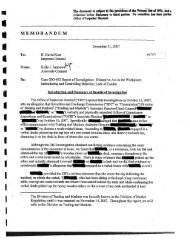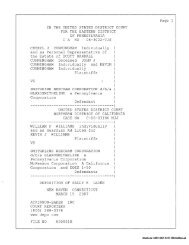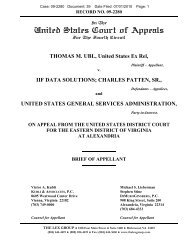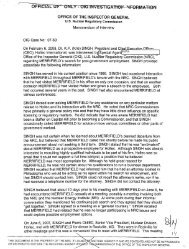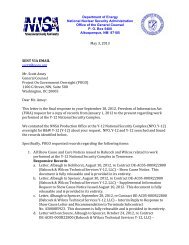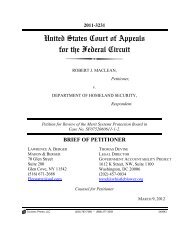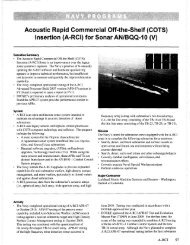SA McCaskill Cost Hearing Final 03 29 12 - U.S. Senate Homeland ...
SA McCaskill Cost Hearing Final 03 29 12 - U.S. Senate Homeland ...
SA McCaskill Cost Hearing Final 03 29 12 - U.S. Senate Homeland ...
Create successful ePaper yourself
Turn your PDF publications into a flip-book with our unique Google optimized e-Paper software.
contracts in order to save money. It did not conduct a comprehensive cost analysis in order to<br />
answer the most basic of procurement questions: whether contractors cost less than government<br />
employees.<br />
Senators Joseph Lieberman (I-CT) and Susan Collins (R-ME) have examined service contracts,<br />
but that has not resulted in government-wide policy change. On February 23, 2010, Senators<br />
Lieberman and Collins sent a letter to Department of <strong>Homeland</strong> Security (DHS) Secretary Janet<br />
Napolitano expressing concerns about the number of DHS contractors, the costs, and whether<br />
contractors were performing inherently governmental functions. 45 Specially, the letter stated:<br />
We also note that DHS’s FY 2011 budget request reflects several instances of<br />
cost savings resulting from the conversion of contractor positions to federal<br />
employees. While the fundamental question in deciding whether a federal<br />
employee should perform a task, or whether the task may appropriately be<br />
assigned to a contractor, should not simply be which option is cheapest but rather<br />
whether or not the government’s interests are best served by having the work<br />
performed by federal employees, nonetheless it is notable that the shift to a<br />
more appropriate employee-to-contractor ratio may well also save the<br />
Department and the taxpayers money. (Emphasis added)<br />
On October 14, 2011, the Senators sent a letter to the Joint Select Committee on Deficit<br />
Reduction, proposing many cost savings reforms. 46 The letter included the following<br />
proposal:<br />
As with decisions about the number of federal employees, we believe that the best<br />
way to achieve desired cost savings in contracting is through the statutory limits<br />
on spending that were put in place under the Budget Control Act. Such an<br />
approach to reducing spending will ensure, for example, that any reductions in<br />
the number of federal employees will not merely be offset by increases in the<br />
number of contractor employees, who may, depending on the services<br />
procured, be more expensive than federal employees. However, control of<br />
contractor costs, as well as federal employee costs, must be a key component of<br />
deficit reduction. We therefore recommend that the Joint Committee consider<br />
requiring that agencies reduce their reliance on management support services<br />
contracts by 15 percent in Fiscal Year 20 <strong>12</strong> (as OMB has proposed), for a<br />
savings of $6 billion. (Emphasis added)<br />
Regrettably, Congress has not meaningfully helped federal agencies save money with regard to<br />
service contracts. Congress has all too frequently legislated without having the empirical data<br />
needed to make informed decisions about whether it would be more cost effective to increase the<br />
45 Letter from Senators Lieberman and Collins to Secretary of the Department of <strong>Homeland</strong> Security Janet<br />
Napolitano, February 23, 2010. http://www.hsgac.senate.gov/media/minority-media/senators-lieberman-collinsastounded-dhs-contract-workers-exceed-number-of-civilian-employees<br />
46 Letter from Senators Lieberman and Collins to Secretary of the Joint Select Committee on Deficit Reduction,<br />
October 14, 2011, p. 4. http://www.hsgac.senate.gov/download/lieberman-collins-letter-to-super-committee<br />
11


